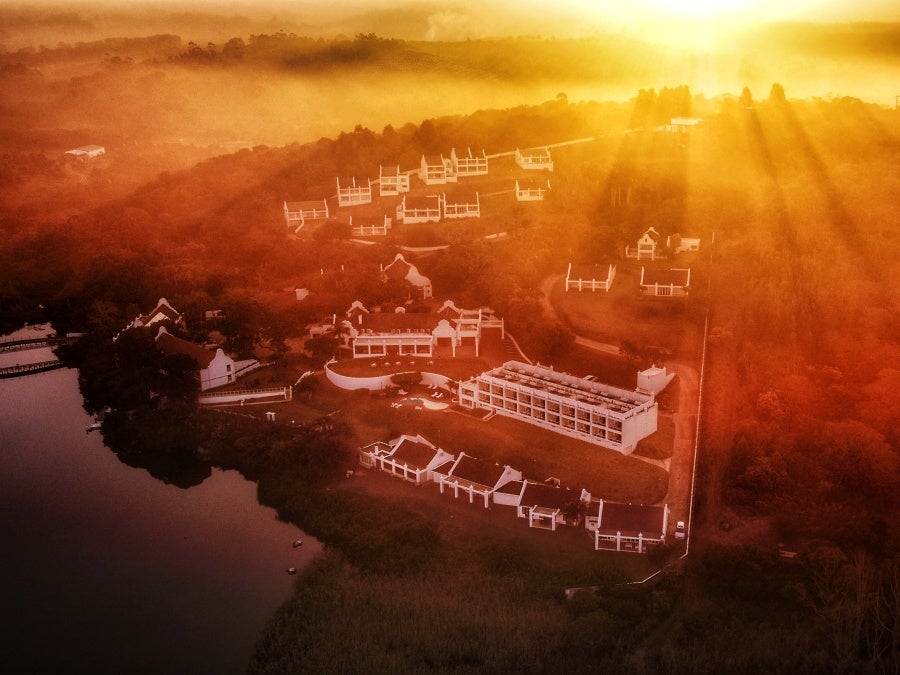
Having narrowly avoided Day Zero in 2018, South African winemakers would have been forgiven for wanting to stand and catch their breaths in the years that followed. But Covid lockdowns and alcohol bans put paid to any rest, alongside curfews which decimated the industry, global inflation, soaring dry goods prices and now flooding – all against a backdrop of continuous blackouts.
But somehow, South Africa’s winemakers remain positive.
“The first thing I’d like to say is, I’m optimistic,” says Jeremy Borg, co-founder of Painted Wolf Wines.
“One of the opportunities that we have is to turn the adversity that we’re facing actually to make our businesses beacons of light in the country, to provide good jobs for people, and to do things that are environmentally sound.”
This optimism was a current that ran through many winemakers’ accounts of their businesses at the Wines Of South Africa tasting in London this month when talking to Just Drinks.
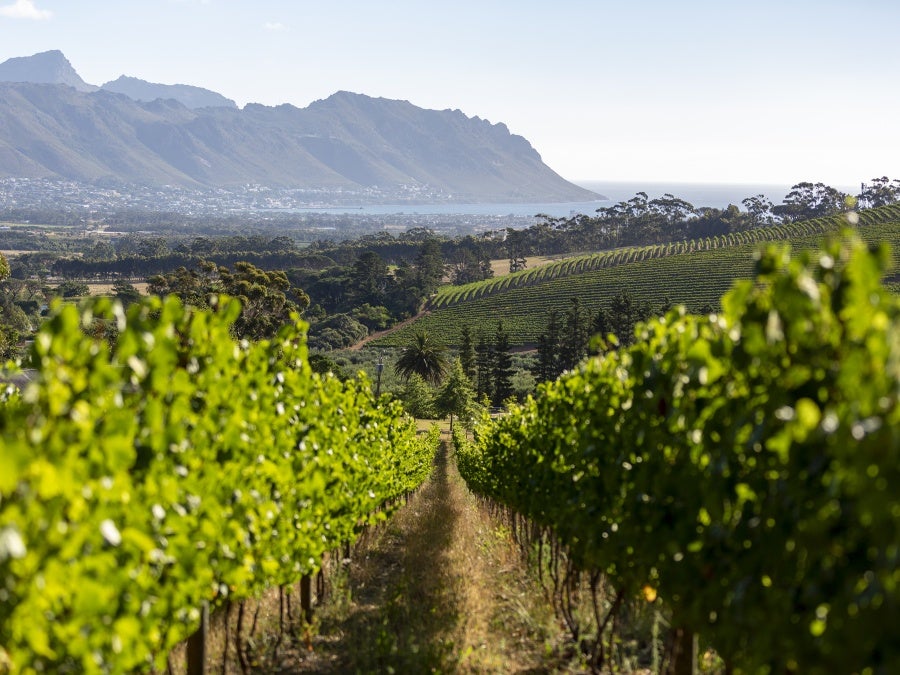
Handling loadshedding
Daily power cuts continue in South Africa, meaning winemakers are left without refrigeration for vats, electricity to bottle or internet to do admin.
A tracker with data from Outlier Logo & ESP Logo EskomSePush shows the country has experienced 4,264 hours of loadshedding this year at the time of writing. There has only been one day free of loadshedding in 2023.
“The shortage of electricity is a significant problem,” says Borg. “My business is small and I’m not very well capitalised. I can’t afford to buy a generator to power up my machines. Our way of working around the loadshedding was to plan our way through it.”
The team’s planning is all guesswork, predicting each evening what can be done the following day. While growers are less affected by the power cuts, Painted Wolf Wines’s operation is purely winemaking – Borg buys grapes from around six growers in different regions.
Loadshedding necessitates creativity in the winery – usually a tightly controlled environment. “Many of the preconceived notions about how you actually go about making wine need to perhaps be altered to cope with this situation,” Borg says.
Loss of refrigeration has impacted the cooling and settling of Borg’s white wines, leaving them slightly tannic. But, in characteristic South African fashion, he has found an optimism in this effect. “Fortunately, there’s a place in the marketplace currently for slightly phenolic white wine. Orange wines are mostly like that,” he says.
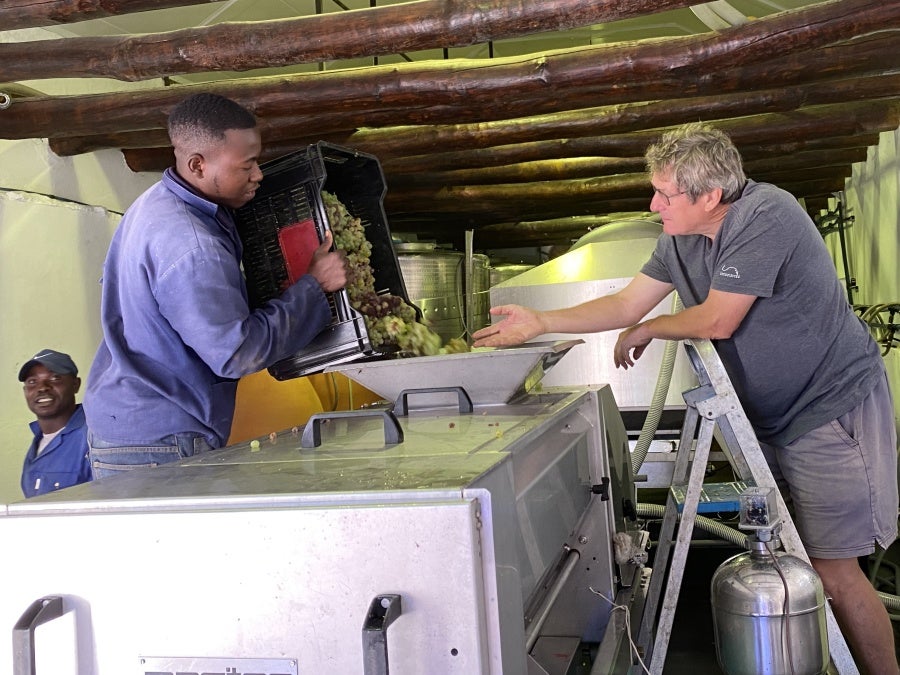
For Johan Reyneke, owner of Stellenbosch-based Reyneke Wines, the impact of loadshedding is tangible on his staff.
“There’s a demoralising effect on the people who work there – they go home and they don’t have electricity, they come to work and they don’t have electricity, it feels like we’re shuffling the chairs on the Titanic – the ship is busy sinking and here we are trying to build a little business.”
“But,” he adds, “South Africans are incredibly resilient and they look for an opportunity in a crisis.”
He says there are (unintentional) environmental benefits to loadshedding. “We will probably meet the UN carbon targets for the simple reason that we can’t generate electricity. And there are renewable energy benefits – there are a lot of people going for solar panels and things like that, who didn’t consider doing so in the past… Necessity breeds invention, and that’s definitely an upside.
“But not everybody is in a position to buy a generator or to put solar on the roof. It costs money. It slows down growth and it erodes profits… So that is a big challenge.”
South Africa’s approach to sustainability
South Africa has had a strong focus on sustainability for some time – though less around carbon footprint and more about conservation and community.
Rollo Gab, managing director at Journey’s End Vineyards, points out “South Africa has been under the international spotlight since Apartheid”, which has shaped business culture in the country.
“When Mandela was released, people became politically free. But economics works differently,” adds Reyneke. “It’s often multi-generational and structural and you can’t just remove certain laws and say it’s an equal playing field for everyone. You actually have to give those people who were left behind a leg up to catch up with the rest.”
Reyneke Wines set up the Cornerstone Project, which aims to “give people a financial leg up” by providing housing and education. In the long term, the project is focused on poverty alleviation, education and financial independence for its farm and winery workers.
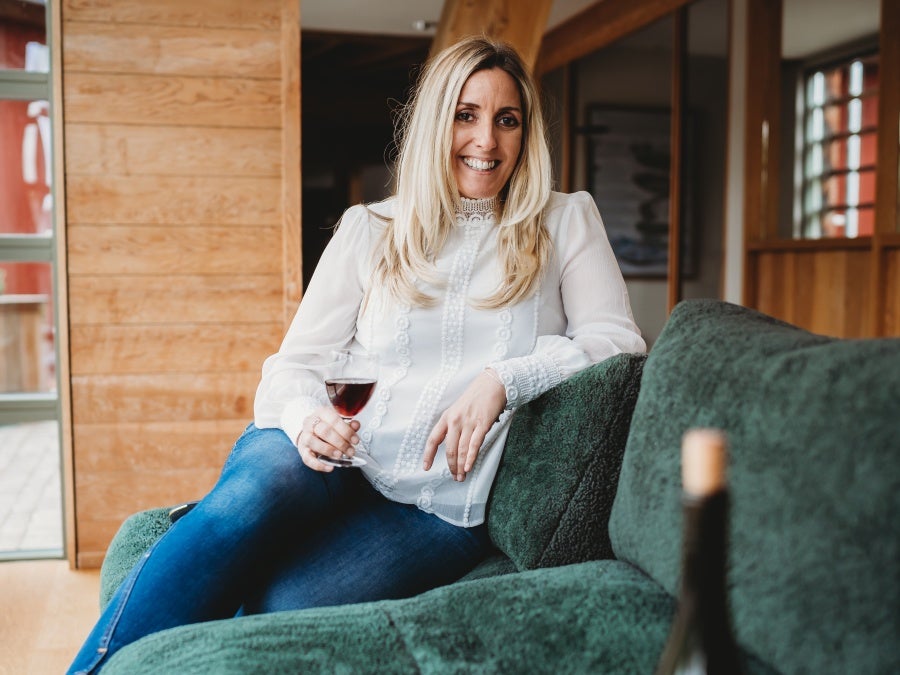
Kim Wilson, UK managing director and founder of UK-based importer North South Wines, says: “South Africa is very focused on the community side of things, sustainability and people.
“Here today you can see there is still a lot of still heavyweight glass in the room… We talk a lot about carbon neutral and offsetting emissions [at North South Wines], and it’s not a conversation that always happens with South African wineries. It’s more about what we are doing from the fair trade point of view or the community point of view. In the past, they’ve always focused on that, which is brilliant. I think that [sustainability initiatives like] lightweight glass and organics will come.”
For Painted Wolf Wines, distributed by North South Wines in the UK, conservation is the “DNA of our business”. Named after the endangered African wild dogs – or painted wolves – Borg founded the company with his wife Emma in part to raise money for wildlife conservation projects. The couple donate 4-5% of total revenues to conservation organisations.
“My goal is to be is to be the most relevant conservation winery in the world,” Borg says. “We hit a resonance with people that really know about conservation because what we do is actually tangible.
“I think our model is unique… Everything to do with our marketing positioning and the way the business is structured puts conservation at the heart of what we do.”
Organics
While many South African wine farms use organic practices, the cost of certification remains a barrier as well as the inflexibility in difficult years. Reyneke is still the only certified biodynamic winery in the country.
For Reyneke, biodynamic farming is the “selfish” side of sustainability compared to his work with the Cornerstone Project.
“Regenerative and biodynamic farming sounds very nice and kind and altruistic and in a way it is, but, in a way, it’s also selfish, because it’s got direct, tangible benefits for the business.
“The way we farm buffers us against global warming. Biodiversity buffers us against risk; insects and pests and plagues and disease taking over the property.
“Looking after people and nature carries one in difficult times more than anything else… it gives much deeper meaning.”
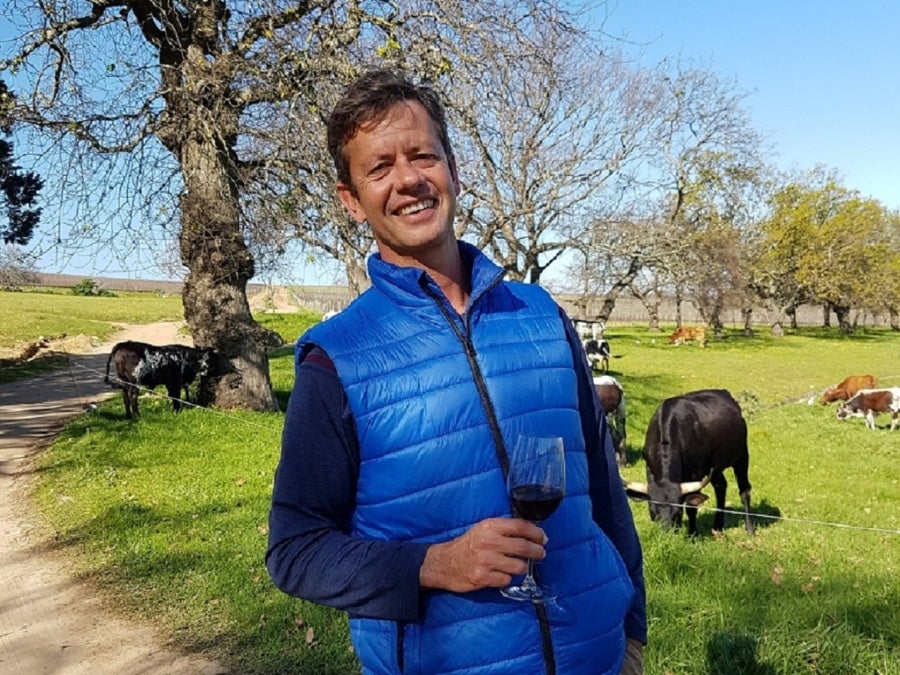
Reyneke says farming biodynamically and moving to a self-sufficient ecosystem is also one of the best ways of ensuring profitability.
“In the past, I used to buy fertiliser and herbicides and pesticides and fungicides. They all came at a huge cost and our currency is weak and was devaluing annually so the pressure on profit was getting bigger and bigger.
“I don’t farm like that anymore. We have a herd of cows in the vineyards in the winter months, we collect the compost, feed the vines take the waste from the cellar, feed that back to the cows again. I hardly buy anything to farm anymore. This system looks after itself.”
Reyneke is noting changing consumer preferences which he feels will force producers’ hands when it comes to organics.
“Honestly, I think farmers are scared of change because with that comes risk and I think they have their backs against the wall financially.
“What I see is changing consumer preference. Young people have a very different value system. And I think as consumption patterns change production will follow. So, to me, it’s not a question of if, but when.
“We’re absolutely just a little bit early on this curve but I see a lot more farmers going, perhaps not biodynamically because of the esoteric connotations attached to it, but at least organically, sustainably, regeneratively. Whatever the consumer demands, farmers will produce. It will come.”
Changing consumer demands for South African wine
While entry-level wine still dominates South African exports, more expensive wines are also increasingly tussling for market share.
“If you rewind to the late 90s and 2000s, the South African category was solely under £10 [in the UK],” reflects Gabb. “It was driven by Kumala, which is a brand that we used to own as a family… but it was all relatively entry-level and mid-tier.
“Now what you’ve got is a real push for South Africa above £10 in retail – we are seeing really healthy volumes in that space. Even in the on-premise, our top wines are doing phenomenal volumes now. Bottles at £80-130 on a wine list. The Destination [Chardonnay] is doing three times more what it was doing five years or so ago.
“I do believe that the UK consumer and those that know about wine are now open to exploring South Africa. But, for the volume, I’d say 85% is entry-level and mid-tier.”
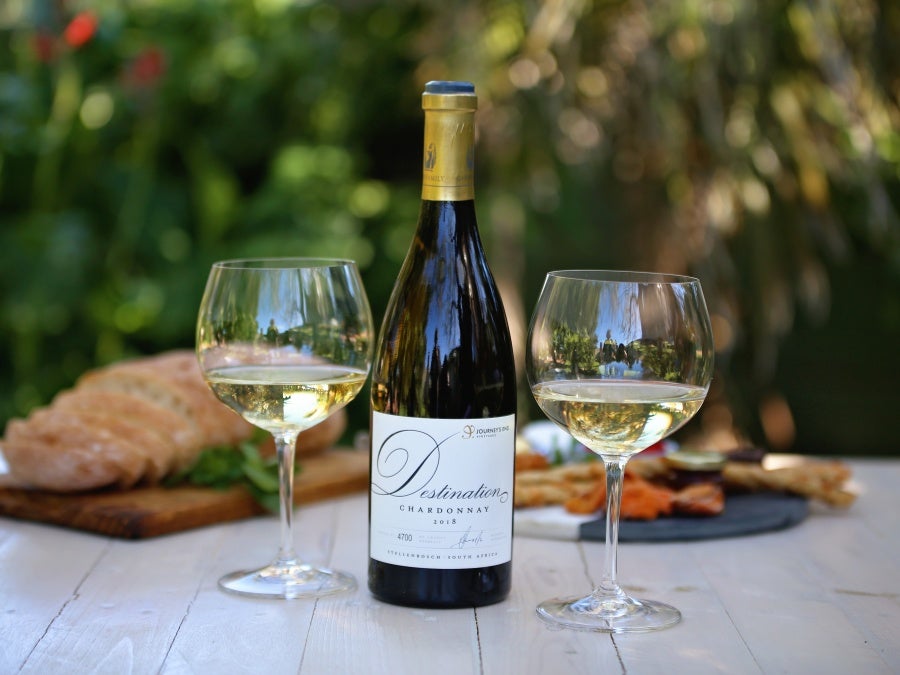
Gabb has concerns for the entry-level end of the market, where profitability is a struggle. “One of the major [issues] is that the majority of growers/producers are nonprofitable in South Africa. And therefore, for many people, it’s becoming more interesting to plant citrus than it is to plant grapes,” he says.
“There’s a risk that vineyard sizes will continue to decrease – which they have – which will in turn mean that supply diminishes. And South Africa as an industry will be further threatened because the cost of everything will go north and we will become uncompetitive.”
South African wine’s ‘value’-driven image
One ceiling to crack for South African wines is the idea it should be cheap.
Wilson says the country provides “immense value for money”, estimating “a £20 bottle of wine for most South African winemakers would be worth at least £40 compared to something from the Old World, particularly France”. But she says the country can suffer from its ‘value’ image.
“South Africa sometimes gets tarred with that brush of okay, New Zealand’s having a bad vintage, let’s switch everything to South Africa Sauvignon Blanc, and then you see a big spike in sales and fairly cheap prices. But for me what South Africa is great at is that £8-10 retail price range where you just see such great value for money for the quality.”
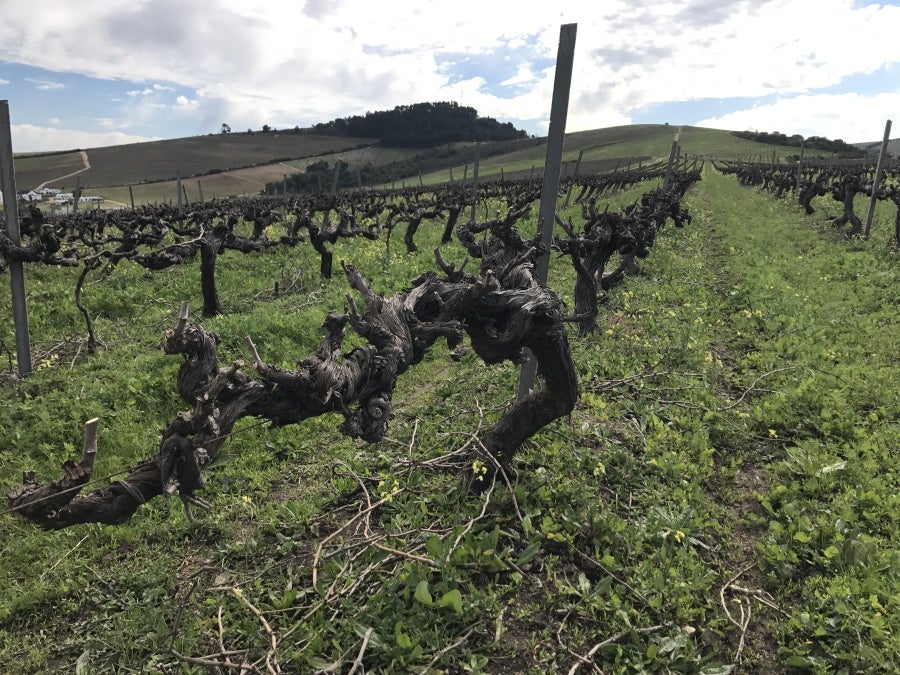
“Value doesn’t have to be cheap,” Gabb points out. “Yes, value is key, because we’ve got to work harder than anyone else in the world to make real progress and to demonstrate that we are fully deserving of a place on the top table alongside Burgundy, Bordeaux, Napa, which command a far higher price for their wines on average than what South Africa can.
“From a blind-tasting quality perspective, there,s absolutely no question South Africa is already there. We have to come in under Burgundy for our Chardonnays if we really want to get traction. That’s fine. We’ll be producing way better wines at better prices.”
Wilson also extolls the potential for South Africa’s sparkling wine, Cap Classique. “A lot of people that drink Champagne would drink Cap Classique and not have a clue that it’s from South Africa. There’s some really good things that we can do there,” she says.
“You can get some really nice wines with 12 months on lees at a third of the price of Champagne. And I think the quality is amazing. It is a really good area to be looking at. Something that can sit on-shelf at £15 and under is just a really great value for money.”
For Gabb, Cap Classique is still a “niche”. “I think it might work as a category – for us it’s a niche product, we don’t produce huge amounts,” he says.
Exports: the UK market
The UK is South Africa’s largest export market. It is also the most significant for many, including Painted Wolf Wines. But Borg says shipping delays at the port of Cape Town, exacerbated by bottling delays caused by loadshedding, “continue”, having a direct impact on sales.
“[The delays] means out of stocks in the UK,” Borg says. “We sell to independent wine merchants, so when you’re out of stock they put someone else’s wine on the shelf and then you struggle to get your space back.
“I’ve been here for six weeks visiting customers without having the stock that I had expected to be able to launch and sell in the UK over that period of time.”
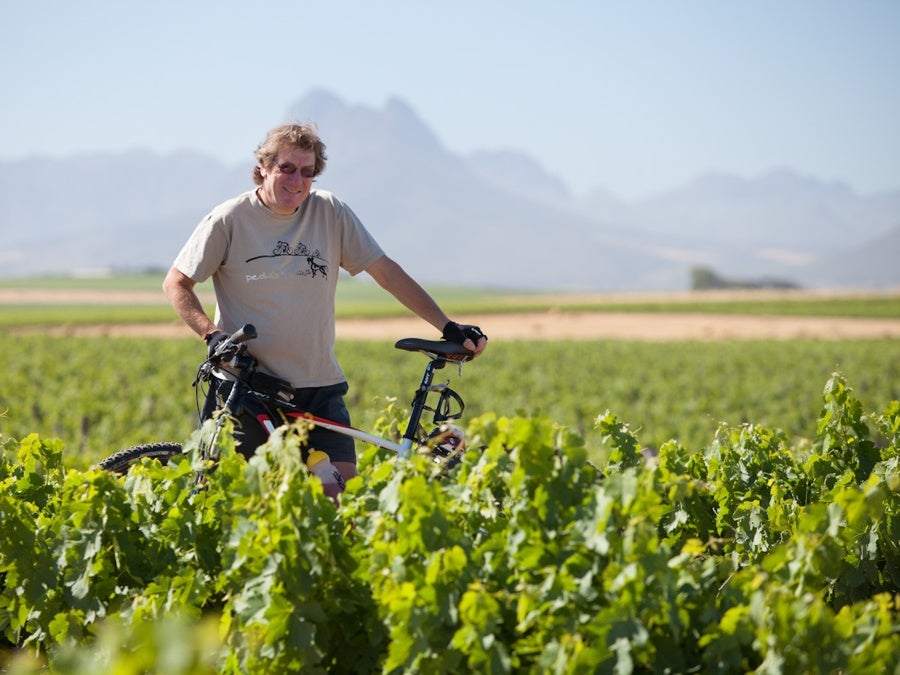
Wilson says “the last 12 months has been awful” in terms of shipping, as lead times and prices have varied wildly.
North South Wines, which will celebrate its tenth birthday next year, took a hit on margins last year to keep South African wineries in stock. “As a business, we took the view just to ship wine because we just wanted to keep people in stock.
“We had to squeeze margins a lot and just look at the whole business of where we cut costs and everything. We were lucky because we have good cash flow, a good balance sheet, and that’s the main thing that you need.”
Other export opportunities for South African wine
As well as the UK, winemakers see opportunities in the Middle East, Asia, Scandinavia and North America.
Gabb questions the potential of the US market, however. “There are a lot of people investing lots of money in the US. I question that because I’ve always found the US to be quite fickle on suppliers,” he says.
He says he is “very excited” by the Middle East, particularly Dubai, Abu Dhabi and – “in time” – Saudi Arabia, while Oman’s trade deal with the US is a barrier.
Reyneke says the US is “a harder market to break into, although we making inroads”. Reyneke Wines is seeing “tremendous growth” in Scandinavia, particularly Norway, and in Canada. He puts this down in part to the government monopolies in these markets, which “set certain environmental and social standards”.
Meanwhile, Painted Wolf Wines is on the cusp of signing a distribution agreement with India, which Borg describes as “the jewel” of export markets. He worked with an Indian representative based in Singapore to broker the deal and said relationships were key to entering the market successfully.
It exports to 14 other countries, with the UK as its largest market. The Borgs have worked with their contact in Singapore for some years and are “slowly” growing that market as well. They also plan to enter Indonesia, Vietnam and the Philippines.
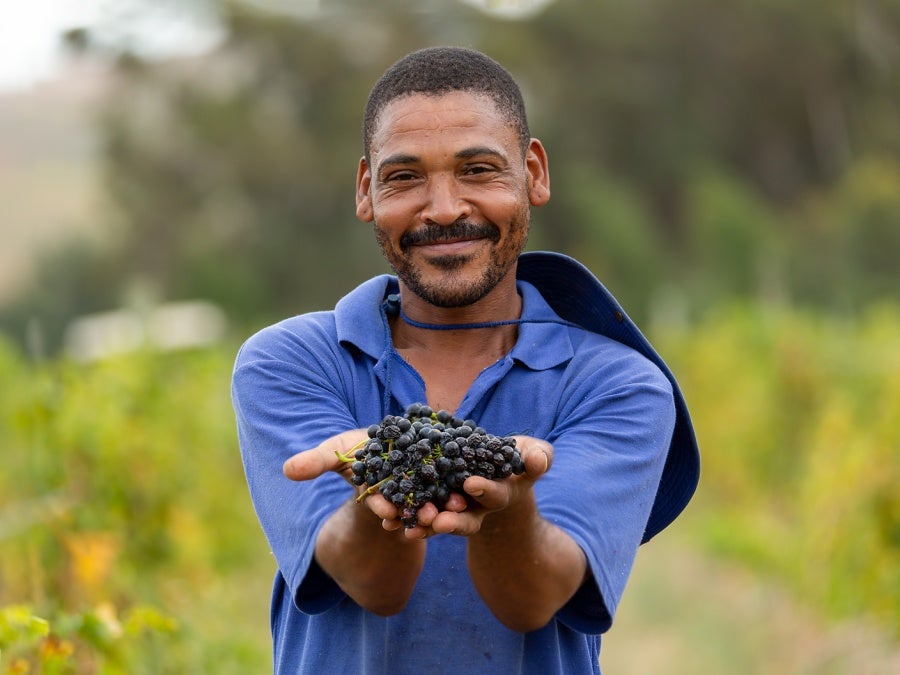
While the onslaught of challenges seems relentless for South African winemakers, they remain remarkably stoic. In the face of ongoing adversity, many have chosen to innovate and give back to their communities. “The South African wine industry is always under stress,” says Gabb. “There’s an ongoing sort of theme here of – challenges is a polite word to use! Of general navigating of very rough sea. You have just got to get used to it. That’s what being a wine producer is about.”



